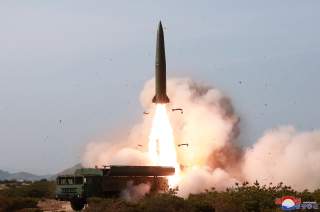Why Security Guarantees Are the Key to Solving the North Korean Nuclear Crisis
Pyongyang will not lower its guns without a promise that it won’t be harmed. Could this be the key to peace on the Korean Pennisula?
Reductions will have to be negotiated gradually to overcome the seventy years of war, division and fear that divide the Korean Peninsula. There should first be frequent correspondence and face-to-face discussion among civilian and military analysts and planners. It is to be expected that participants will at first be wary and only minimally forthcoming. The record of such conferences in Europe during the late Cold War era nevertheless reveals that participants learned over time to work toward shared goals. Growing trust eventually yielded an agenda that had real potential for a negotiated agreement.
The reductions will likely start with small, low-risk, reciprocal moves. These signaling gestures should, wherever possible, address military capabilities that the other side considers most offensive or “hostile.”
As an illustration, there could be a drawing down of marine infantry formations optimized for (counter-) offensives from the sea into the rear of the enemy—a tactic famously used by General McArthur in the Inchon landing. As an opening move, South Korea might announce that it would put into reserve status a few thousand of its Marines and then look for a reciprocating move by the North. It is not important that the move be of like kind. It could consist in a cut in the North’s own marines or, say, in the standing down of a class of missiles or artillery. The point is that the move should signal something of value which can then be read to encourage another move by the other side.
The advantage of starting with small, low-risk moves is that one can easily imagine dozens of them, each signaling slightly different things, including some involving the United States. A multiplicity of such “trial balloons,” so to speak, would allow the gathering useful information about the intentions and sensitivities of the other side. Several rounds of such reciprocal steps can then open the way to formal talks for large-scale disarmament.
You Get What You Pay For
Which security guarantees the United States should offer ultimately depends on how much of the North Korean nuclear program it is serious about eliminating. While it appears unlikely today that North Korea would ever give up the totality of its arsenal, there are several ways in which the United States can significantly reduce the threat it poses. It can notably seek to cap the nuclear arsenal, institute international monitoring of nuclear material production facilities, limit missile ranges, and ban proliferation to other countries. Of course, the more Washington asks for, the more Pyongyang will request in exchange.
The advantage of using security guarantees here is that they kill two birds with one stone. Not only do they put North Korean nuclear capabilities under control, but they also reduce the tensions that could have led to their use. Concluding a peace agreement, in particular, would remove the main reason North Korea is aiming its weapons at the United States in the first place.
Henri Féron is a senior fellow at the Center for International Policy. Follow him on Twitter @henriferon.
Charles Knight is co-founder of the Project on Defense Alternatives and an Associate of the Center for International Policy. Follow him on Twitter @defensealt.
Image: Reuters

